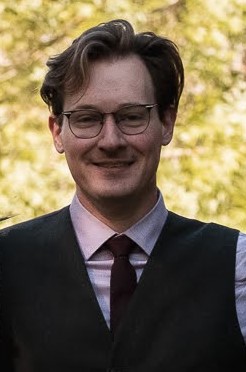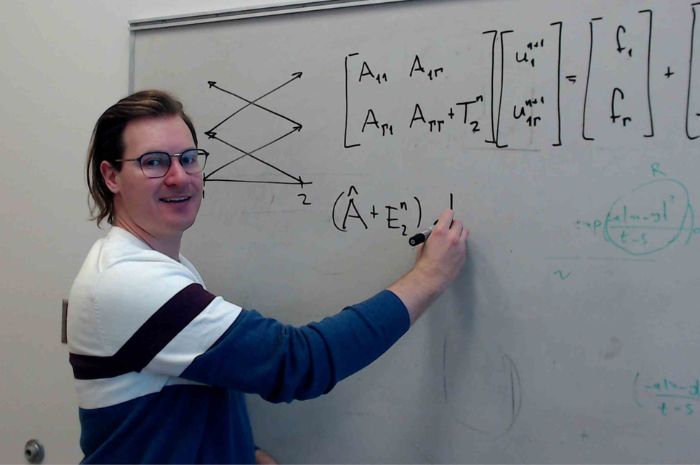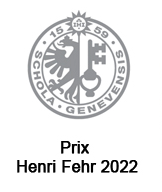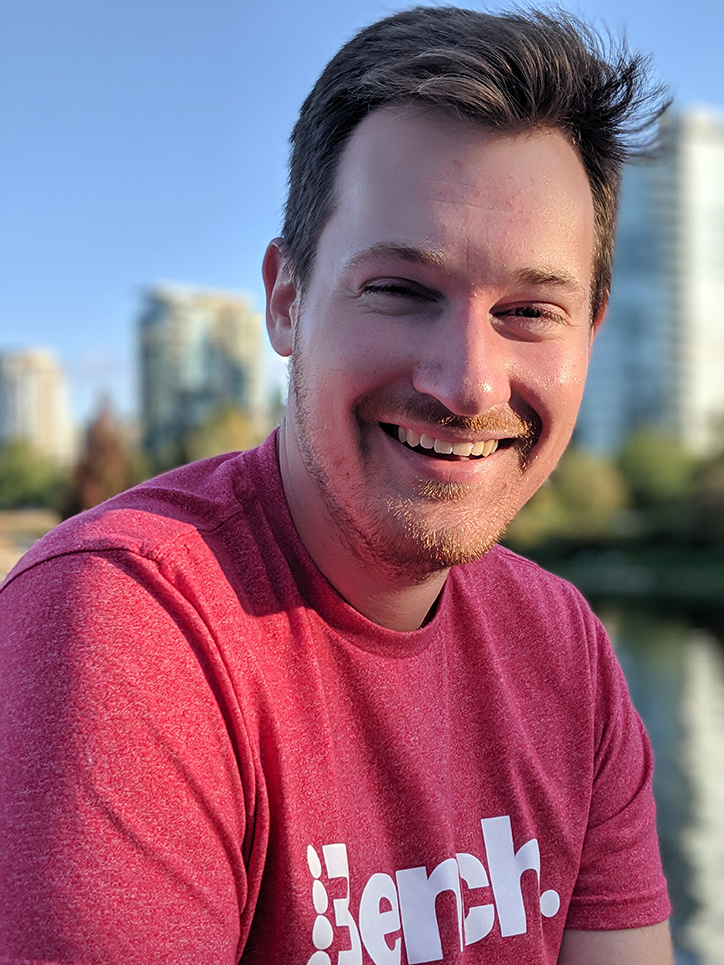Interview avec Conor McCoid, lauréat du prix Henri Fehr 2022
Express Bio: 
Place of birth: Trail, BC, Canada
Bachelor: Mathematical Physics, SFU
Master’s supervisor: Manfred Trummer, SFU
PhD supervisor: Martin Gander, UNIGE
Currently: Felix Kwok, Université Laval
Conor McCoid received the 2022 Henri Fehr Prize awarded by the journal L'Enseignement Mathématique, for his thesis:'' Towards robustness in algorithms: accelerated domain decomposition, multisecant equations, and simplicial intersections”. The Prize rewards the best doctoral thesis in mathematics of the year at the University of Geneva.
About his research…
I work in numerical analysis, specifically the study of numerical algorithms for various problems.
For the last four years, I have been focused on domain decomposition methods, which are basically taking large problems with large domains and subdividing the problem. Solving them in smaller domains and then reconstituting those solutions into a larger solution, usually through an iterative process. Martin Gander, my PhD supervisor introduced me to this area of research.
Why it’s important..
As computers get faster and smarter, we have reached a limit where we can’t really make processors any bigger, so instead, we have to connect many processors together. Doing this means that the computations have essentially reached a maximum size, so instead of coming up with ever-larger computations, we need to be able to split these computations into smaller ones.
If we want to solve the big problems in the world, weather forecasting or any kind of modelling that goes into the future, we will need parallelization on a grand scale, and these techniques, these algorithms are an essential component.
Possible applications…
As an example, in terms of applications at the Université Laval where I am at the moment, they currently have a contract with the tyre manufacturer Michelin. Basically, Michelin needs specific tyres to solve specific problems and modelling a tyre is a rather involved and large problem to solve. In order to make it less computationally expensive and to actually be able to run it on many processors, you have to split the problem into pieces and solve those smaller pieces.
On winning the 2022 Henri Fehr Prize…
It was quite unexpected for me to receive this prize. I think that perhaps an influencing factor may have been that at a glance, it was an easy-to-understand topic. One of the examples that we gave in the thesis was intersections of triangles and understanding the intersection of triangles can be very straightforward. Many people were surprised that we did not already have a robust algorithm to handle these calculations. Maybe this is why it was so powerful, the fact that there should have been something similar before. It turns out the ideas are simple enough but they are perhaps not obvious enough at first glance, but you can get so much complexity out of the topic.

The path into mathematics
When I started my university education at Simon Fraser University in British Columbia, I didn’t know what I wanted to do, so I stayed in general sciences. I was planning on taking six minors, I was in earth science, biology, and chemistry before finally settling for physics. It can be helpful to try a variety of things before you decide what you like, and not only can it be beneficial to try out different sciences, but also different areas.
Having spent two years studying physics, I decided to switch from sticking to concrete ideas by doing a double major in both mathematics and physics.
That summer I secured an undergraduate student grant and started working with Manfred Trummer (Simon Fraser University) on a numerical analysis project. From this point onwards I stayed in applied mathematics. After my Master's, Manfred put me in contact with Martin Gander, as I was interested in continuing with numerical analysis and he was one of the big names in the field. So, I moved to the University of Geneva for my PhD, which I recently finished.
UNIGE Section of Mathematics
One of the things I most enjoyed about UNIGE was the size of the Section of Mathematics. Everyone knows everyone. I really enjoyed walking down the hall and being able to stop and have a chat with people about what they were working on. At the Zbar, I also met people from all walks of mathematics, so that was a great opportunity to see all the different research that was going on.
Being a mathematician…
I think the best part of being a mathematician is that feeling when you get a good result and everything suddenly comes together in a moment and it all simplifies and boils down to some basic truth of the universe. There is something magical about that. I also enjoy teaching maths to the next generation and trying to come up with ways so that the material makes sense to everyone in the class, because everyone connects in different ways to things around them. It’s also a good feeling to see the students experience the same magical eureka moments when things come together and suddenly make sense.
The obstacles...
Time management and figuring out ways to get everything done in time. I often felt I never had enough time for everything. An example is balancing teaching and research or applying for money and grants, which has gotten more complicated over the years. This has been a bit of a challenge. I often think you have to devote time to time management. So that means sitting down and writing a schedule of what needs to be done first, what can be accomplished fastest, and figuring out a good order of doing things. Then, also making sure that you hit your deadlines, and not only the deadlines set by other people but those you set for yourself too.
Industry vs academia?
Currently, I am at Université Laval for the next year. After that, I am not sure. I would like to stay on in research. There is something very gratifying about proving things and I am fascinated by the underlying details of algorithms. Applying algorithms is of course interesting and it gives you great examples, but for me the interesting work is studying their convergence, studying how you make them, and so I see myself staying on in research.


8 mai 2023
